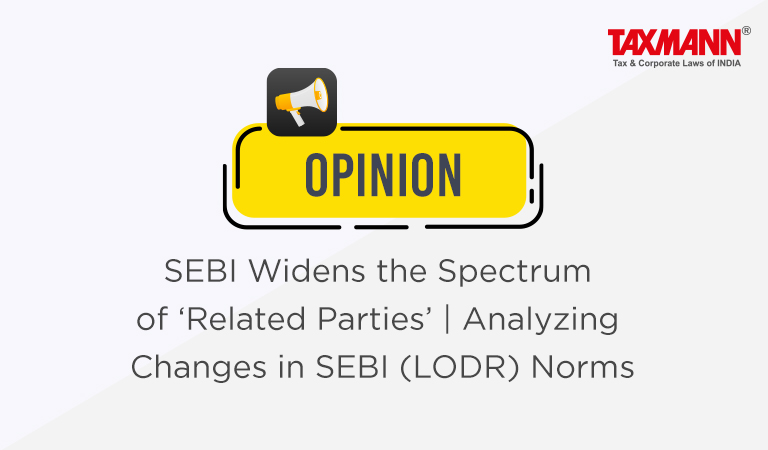[Opinion] SEBI Widens the Spectrum of ‘Related Parties’ | Analyzing Changes in SEBI (LODR) Norms
- News|Blog|Company Law|
- 2 Min Read
- By Taxmann
- |
- Last Updated on 16 May, 2023

Rani Jha – [2023] 150 taxmann.com 220 (Article)
With an aim to strengthen the regulatory norms and address corporate governance issues relating to RPT, SEBI has broadened the spectrum of related parties in SEBI (Listing Obligations and Disclosure Requirements) regulations 2015 vide its notification SEBI/LAD-NRO/GN/2021/55 also called as Securities and Exchange Board of India (Listing Obligations and Disclosure Requirements) (Sixth Amendment) Regulations, 2021. The amendments were mostly recommended by the Working Group constituted by SEBI in November 2019 comprising members from the Primary Market Advisory Committee (PMAC).
These amendments are made applicable in a phased manner coming into effect from 1st April 2022 and 1st April 2023 respectively.
We are substantially covering here the amendment which shall be applicable from 1st April 2023 keeping in mind the changes done w.e.f. 1st April 2022 w.r.t. Change in definitions, thresholds of material transactions, enhanced role of Audit committee, Shareholders’ Approval on RPT and stock exchange disclosures along with the rationale behind this paradigm shift in the RPT approval and disclosures requirement.
1. Definition of Related Party
Regulation 2 (1) (zb): all parties covered under section 2(76) of the Companies Act 2013 or under the applicable accounting standards.
However, SEBI vide its notification SEBI/LAD-NRO/GN/2021/55 has introduced deeming fiction in the definition of related party resulting in the inclusion of promoters in the arena of Related Party in order to ensure appropriate disclosure.
Accordingly, the following parties shall be deemed as related parties in accordance with the aforesaid amendment;
- any person or entity forming a part of the promoter or promoter group of the listed entity; or
- any person or any entity holding equity shares :
(a) of 20% or more; or
(b) of 10% or more, w.e.f. 1st April 2023
in the listed company either directly or through its beneficiaries as mentioned under section 89 of the Companies Act 2013 at ANY TIME during the immediate preceding Financial Year.
Exceptions: Units of Mutual funds which are listed on the Stock exchange are exempted from the aforesaid definition.
Rationale behind the amendment:
- SEBI ICDR 2018 defines a “promoter” as a person who has control over the affairs of the issuer, directly or indirectly whether as a shareholder, director or otherwise or in accordance with whose advice, directions or instructions, the board of directors of the issuer is accustomed to act. Further, a significant percentage of Indian businesses are structured as intrinsically linked group entities that operate as a single economic unit, with the promoters exercising influence over the entire group. Thus, the promoter or promoter group may exercise control over a company irrespective of the extent of shareholding.
- There is also a possibility of a shareholder not being classified as a promoter but may be exercising influence over the decisions of the listed entity by virtue of shareholding.
Click Here To Read The Full Article
Disclaimer: The content/information published on the website is only for general information of the user and shall not be construed as legal advice. While the Taxmann has exercised reasonable efforts to ensure the veracity of information/content published, Taxmann shall be under no liability in any manner whatsoever for incorrect information, if any.

Taxmann Publications has a dedicated in-house Research & Editorial Team. This team consists of a team of Chartered Accountants, Company Secretaries, and Lawyers. This team works under the guidance and supervision of editor-in-chief Mr Rakesh Bhargava.
The Research and Editorial Team is responsible for developing reliable and accurate content for the readers. The team follows the six-sigma approach to achieve the benchmark of zero error in its publications and research platforms. The team ensures that the following publication guidelines are thoroughly followed while developing the content:
- The statutory material is obtained only from the authorized and reliable sources
- All the latest developments in the judicial and legislative fields are covered
- Prepare the analytical write-ups on current, controversial, and important issues to help the readers to understand the concept and its implications
- Every content published by Taxmann is complete, accurate and lucid
- All evidence-based statements are supported with proper reference to Section, Circular No., Notification No. or citations
- The golden rules of grammar, style and consistency are thoroughly followed
- Font and size that’s easy to read and remain consistent across all imprint and digital publications are applied



 CA | CS | CMA
CA | CS | CMA
